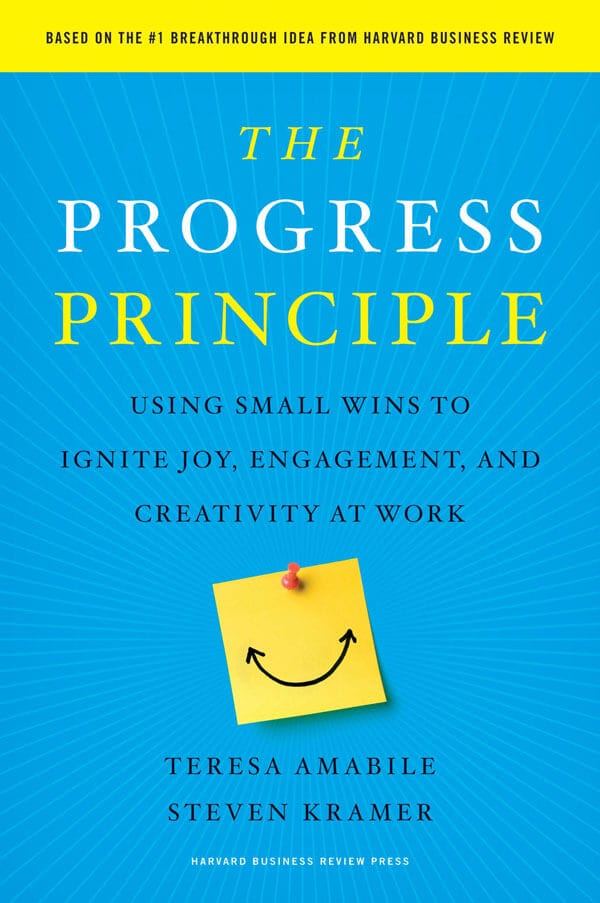What do you think motivates employees? When I ask this question to my clients, typical responses include incentives, bonuses, promotions or awards. In fact, there is an entire consulting category dedicated to helping companies maximize employee retention, engagement and productivity through compensation and rewards strategies. If you are interested in doing just one simple thing to motivate employees, help your employees get small wins, every day. Teresa Amabile is the distinguished Edsel Bryant Ford Professor of Business Administration at the Harvard Business School and co-author of The Progress Principle – Using Small Wins to Ignite Joy, Engagement, and Creativity at Work with Steven Kramer.
Teresa Amabile is the distinguished Edsel Bryant Ford Professor of Business Administration at the Harvard Business School and co-author of The Progress Principle – Using Small Wins to Ignite Joy, Engagement, and Creativity at Work with Steven Kramer. Together, the two put forth an argument based on research that sheds new light on what motivates (and de-motivates) employees to do their best, day in and day out. Similarly, when they asked managers what motivates employees, managers ranked “supporting progress” dead last. As it turns out, however, using over 12,000 points of data Amabile and Kramer ranked “supporting progress” first! In short, managers will do best to help their employees get small wins, every day.
 Using anonymous employee diaries, the researchers were able to gain insights on something they refer to as the “inner work life” (IWL) of an employee – the emotions, internal motivation, and perceptions of colleagues, the organization and the work itself. This is critical for managers to understand because IWL affects four crucial dimensions of an employee’s performance:
Using anonymous employee diaries, the researchers were able to gain insights on something they refer to as the “inner work life” (IWL) of an employee – the emotions, internal motivation, and perceptions of colleagues, the organization and the work itself. This is critical for managers to understand because IWL affects four crucial dimensions of an employee’s performance:
- Creativity – the ability to come up with novel and useful ideas
- Productivity – consistently turning out high quality work
- Commitment – sticking with the project, the task, the team or the organization through difficulties
- Collegiality – any action that contributes to team cohesiveness
As you might imagine, higher levels of the four dimensions above usually signal an engaged, loyal and successful employee. An army of employees scoring high on all four probably leads to greater organizational success, as well.
Not every manager, however, has access to this treasure trove of data about their employees, so managers might want to pay attention to the IWL signs…
- IWL is usually imperceptible to others, so pay attention to your employees.
- It’s about perceptions…some that you may not share. If people do not perceive that they and their work are valued by the organization, if they derive no pride or happiness from their work, they will have little drive to dig into a project. And without a strong drive to deeply engage the problems and opportunities of a project, people are unlikely to do their best work.
- This probably requires managers to have more of an “otherish” point of view as per the research of Adam Grant.
A lot has been written about motivation and it is a constant source of discussion with my clients. Amabile and Kramer argue (as do many other experts) that ever-present extrinsic motivators (eg; bonuses, monetary rewards, etc) eventually undermine intrinsic motivation. They may work in the short term but they set us up for the never-ending battle of constantly changing the rewards to manipulate behavior. Managers are “…much better served by removing barriers to progress, helping people experience the intrinsic satisfaction that derives from accomplishment.”
The authors explain the importance of their findings by reminding us of one of the most basic needs we experience is self-efficacy — a person’s belief that he or she is individually capable of planning and executing the tasks required to achieve desired goals. This strong need to achieve even small wins on a regular basis explains why regular progress on our goals stands out as the key event stimulating event for a positive inner work life.
So, what can you do as a manager to encourage a positive IWL on a regular basis? Amabile and Kramer suggest looking at four categories of what they call “nourishers.”
- Respect – Acknowledge the contribution of each employee. Consider their ideas for solving problems, novel approaches and project plans. And, of course, be professional, kind and compassionate.
- Encouragement – Demonstrate your own enthusiasm for the work your team does and the mission of the organization. It just might rub off! Also, express confidence in your team that they are capable.
- Emotional Support – Simply acknowledging the difficulties of an employee can go a long way whether it be frustration with a new system, grief over a lost loved one or any other difficulty. People feel more connected to their work and the organization when their feelings are validated.
- Affiliation – This may be rising in importance as we use more and more technology to communicate, debate and decide at work. Focus on actions that bring people together and create deeper levels of connection and even affection with each other.
So, the next time you start developing a sales contest or looking at a new compensation plan, consider how one simple thing can do more for motivation, creativity and commitment than any carrot or stick…progress!



